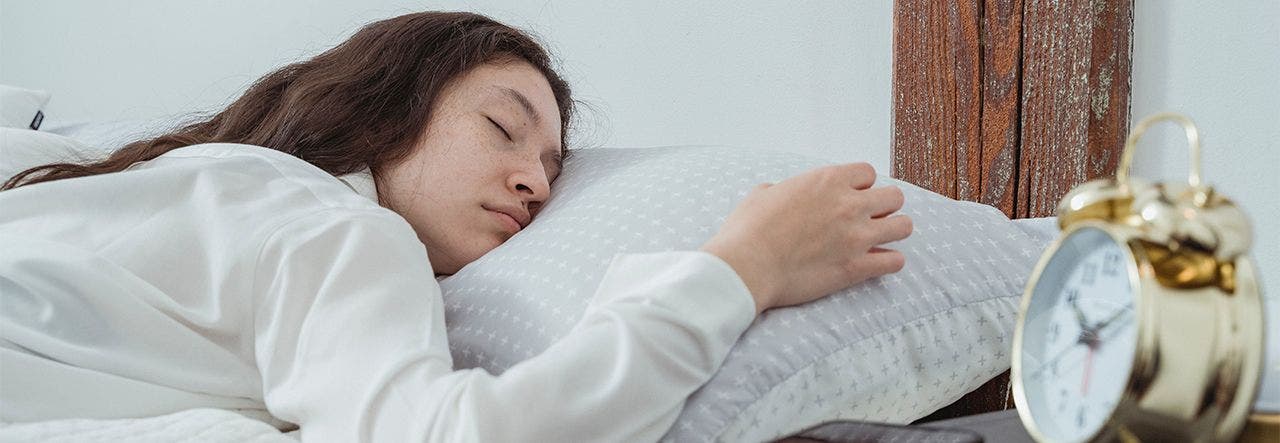Most people know that sleep changes and evolves through infancy and early childhood. We’re familiar with the idea of babies needing a lot more sleep than older children and that they sleep in small chunks. We expect young children to give up naps at some point, we’ve heard of sleep regressions and we’re prepared for our little ones to experience disrupted sleep from teething or other developmental milestones.
What we don’t realize is that the assumption that children will settle into a more “adult” pattern of sleep that then sticks for the rest of their lives is, well, incorrect.
What is a normal sleep pattern for adults? The truth is that sleep continues to change after early childhood and goes on changing through puberty and adolescence and throughout adulthood. Adult sleep changes are more spaced out and happen at a slower pace but how a person sleeps at age eight is probably not how they’re going to be sleeping at 48 – let alone 80.
Our sleep patterns change as we age, and this can come with some sleep disruption. If you’re experiencing a period of poor sleep – and suffering the consequences of sleep deprivation – you may be in an adult sleep regression.
What Is Adult Sleep Regression?


Strictly speaking the term sleep regression refers to babies and young children. As I mentioned, this is usually connected to a developmental milestone. But, essentially, sleep regression means a relatively short period of time, say, a few weeks, when regular sleep patterns are disrupted for a specific reason.
In that sense, the term certainly makes sense in the adult context, too. You’ve probably heard that the average adult needs 7–9 hours of sleep a night, but that can change from one season of our lives to the next with lifestyle factors and much more contributing. And sleep transitions tend to come with sleep disruptions. Considering your bouts of disrupted sleep as adult sleep regressions may be helpful in assessing the factors at play.
9 Factors that Can Result in Adult Sleep Regression
Sleep is impacted by a number of factors in adulthood and as much as having healthy sleep hygiene is important for getting quality sleep, some factors are completely out of our control. When there’s been a shift in your sleep pattern and you can’t pinpoint any obvious external behaviors (for example, switching jobs or starting a new diet) causing this, there may be other, less visible reasons to consider:
1. Hormones
Even long after puberty, hormones continue to fluctuate for all genders, including the hormones that have an impact on sleep such as melatonin and cortisol. Certainly, pregnancy, postpartum and menopause can cause sleep disruptions but those aren’t the only times that hormones can shift and trigger sleep changes. Thyroid issues, changing testosterone levels and others can make getting to sleep and staying asleep challenging throughout adulthood.
2. Insufficient Sunlight
Related to the hormone challenges that can arise, adults who are largely indoors for most of the day may have insufficient exposure to sunlight causing a disruption in the natural rhythms in the body that promote sleep readiness at the end of the day, called sleep pressure. This can interfere with the natural release of melatonin as it gets darker and it becomes a domino effect of difficulty falling and getting back to sleep.


3. Sleep Chronotype
Sleep chronotypes are largely genetic, meaning that “early birds” and “night owls” are primarily born, not made. Yet, as we age from adolescence through early adulthood, chronotypes do typically shift and we become earlier risers. Middle-aged adults tend to have their sleep chronotype stabilize for a while before it starts to shift even earlier in senior adulthood. People who were naturally night owls in their 20s may naturally be early birds in their 70s. Of course, this isn’t true for everyone, but it’s worth considering.
4. Stress
Cortisol is a hormone released regularly in our brains at low levels. Those levels naturally drop in the evening to help us sleep. This hormone keeps us alert, aware and able to act quickly. Extra cortisol is released in sharp bursts in stressful situations, which allows us to think clearly and decisively in the moment. If we’re chronically stressed, our cortisol levels can be far too high to let us wind down and relax to be able to sleep. In fact, if we’re constantly stressed, this powerful chemical in our brain can even inhibit the release of the chemicals that help us sleep.


5. Depression and Anxiety
Mental health challenges can trigger insomnia and other sleep difficulties leading to chronic disruptions, which, unfortunately, can worsen the mental health issues. This can happen at any age and may have an extended duration. If you’re suffering from depression, anxiety, or another mental health disorder, getting restorative sleep is a huge step in managing your symptoms, and it’s a good idea to speak with a professional who can help.
6. Pain
It is no big surprise that pain can interfere with sleep for anyone of any age. It’s not easy to sleep when something hurts! Temporary pain can almost act as a reset to sleep hygiene and sleep patterns which can take time to recover from, and chronic pain can lead to ongoing disrupted sleep.
7. Health Concerns
Heart disease, diabetes, metabolic issues and autoimmune disorders, among others, can completely rearrange sleep patterns. Even long established patterns in adulthood can be thrown off because of health issues. If you notice sleep disruptions that are ongoing and you’ve addressed possible sleep hygiene issues, speak with your health care provider as it may be a symptom of a serious health issue.
8. Brain Development
Brain development slows down in adulthood but continues throughout. For example, the prefrontal cortex isn’t finished developing until around age 24, and the emotional regulation center of the brain continues until about 32. Other areas of the brain continue to grow and develop well into the 60s and learning never stops. This growth can trigger sleep regressions and it’s almost like we have to retrain ourselves to sleep. Thankfully, this is typically easier for adults than young children as adults likely have a positive association with sleep while young children may still be learning that sleep is safe and comforting.


9. Aging Process
The internal clock that tells our brains when to be awake and when to sleep, called the suprachiasmatic nucleus, begins to have fewer cells later in life which can cause it to run a little less smoothly. This can make it more difficult to get back to sleep or be ready for sleep, resulting in shorter sleep stretches and more wake-ups, particularly for senior adults.
Adult sleep regressions can stem from something as simple as twisting your knee playing outside with the kids or spending too much time at your desk to unavoidable life processes like brain development and aging. However, regardless of the culprit, getting quality sleep is important for your physical and mental well-being. Do you have a solid bedtime routine? That could be a good starting point for overcoming your sleep regression. Here are some helpful tips!
 BABY
BABY  KIDS
KIDS  ADULT
ADULT  LEARN
LEARN  STORES
STORES 
